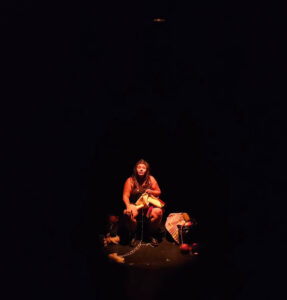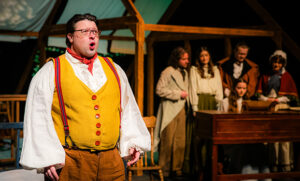One of my favourite things about being in Halifax for an extended period of time is having the opportunity to take my sixteen year old cousin Ashley to the theatre. Incredibly smart and perceptive and with a thirst for knowledge and detail, Ashley has been passionate about the theatre, as both a performer and an audience member, since before I cast her as Wendy in my production of Peter Pan for David Overton’s Directing Class in 2005.
Ashley and I have been going to see shows together for years and we have seen an eclectic mix. I took her to see Neptune’s productions of Beauty and the Beast and West Side Story, two Supernova’s ago we saw The National Theatre of the World’s Impromptu Splendor in the style of Tennessee Williams, last Fringe she saw one of George Dillon’s solo shows and Lee-Ann Poole’s Short Skirt Butch. We once, just for fun, did a dramatic reading of Stewart Lemoine’s A Grand Time In The Rapids in my bedroom where I read both the parts played by Jeff Haslam and the part played by Ron Pederson and Ashley read the part played by Belinda Cornish. This Supernova I took her to Hannah Moscovitch’s In This World. Clearly, my focus has not been specifically on introducing her to Theatre For Young People, largely because having a theatre expressly for this genre of play is a relatively new concept in Halifax. Instead, I have been interested in exposing her to as many different kinds of theatre as possible as well as some of the best playwrights, actors and directors we have in the city and in the country as a whole.
Last Sunday I attended a panel discussion about the importance of Theatre For Young People as part of Supernova Next in conjunction with Halifax Theatre For Young People. The panel was moderated by Chris Heide, co-founder of HTYP and included David Zinck, Drama Teacher and Improv Coach at Dartmouth High, Pablo Felices Luna, Artistic Director of Carousel Player’s in St. Catharine’s, Ontario, Jim Morrow, the Artistic Director of Mermaid Theatre in Windsor, Nova Scotia and Tessa Mendel Artistic Director of Halifax Theatre For Young People. They talked about why theatre for young people is important and how it can be used for emerging artists as a stepping stone into professional careers right out of theatre school.
Here is a recap of that discussion.
Chris Heide: Why is theatre for young people important?
Pablo Felices Luna– I think there is a misconception that theatre for young people is important for audience development, that we are growing the audiences of the future. In fact, I am not interested in that. I am interested in creating theatre for the audiences of today, for the children. These audiences are keenly imaginative and deserving of a theatre crafted with them in mind. Children don’t walk up to the theatre by themselves, they need someone to take them to the theatre and to bring the theatre to them. We are always asking ourselves, “Who is our audience?” and we find it really exciting to create an experience with that specific audience in mind. There is a great creative tension between content and form in young people’s theatre because you have to be incredibly accurate. You can’t tell a story for five year olds and then stage it in a way that won’t be appealing to them. We have to be really on our game, and that is exciting for us!
Jim Morrow: I don’t think about that question because it doesn’t make sense to me. Young People’s Theatre is important because children are important. Why shouldn’t they come to the theatre? Children’s theatre encourages us to think really freely and extraordinarily and I never tire of it. Why are children’s stories, children’s worlds, children’s activities important? If you value that, the theatre is a natural part of it. It is building a community with people and creating a shared experience. It’s interesting because when we’re very young so much of what we do is stimulated from the imagination but as soon as we grow up, theatre for young people becomes something that is done “over there” and we get more immersed in “important” things. After about grade 5 all the really creative activities get taken out of the schools. When we do plays for young children often their teachers want to get them to tell about their experiences with the plays and we get drawings from the younger students. I think that we should be advocating much more for art for young people. Art commenting on art is so immersive; we should be encouraging more of that.
Tessa Mendel: The question in a way is very simple. It’s the same as “why theatre is important?” It is important because it is quintessentially human. It is an art form that is created by humans, with humans for humans. It enriches our sense of humanity and that is what I love so much about it. That is absolutely important, to bring so many kids together and to have them share in this human experience. How can it not be important?
David Zinck: In Grade 11 my students create a play for the Drama Festival and they are writing it for the Junior High students. It is an issue based play, and it becomes very apparent very quickly that to use statistics and textbook information is a boring approach, and they figure out that what is far more interesting is not to make a statement, but to explore a multitude of different perspectives. This makes it less of a narrative and more of a collage. These kids are the future theatregoers of tomorrow. I don’t get to see a lot of theatre, my kids see way more than I do. And as a drama teacher, I always want to take the students to the theatre. You can reference the shows for three years, something they saw in Grade 10, they will still be able to talk about and vividly remember when they are in Grade 12. They remember it even better than I do. I love the fact that in Nova Scotia you have to take an Arts Course in 10, 11 and 12 to graduate. That’s a bit under attack right now. I also love that the drama class blends kids from different backgrounds and forces them to work closely with one another, which often leads to them forming friendships. I see a lot of cases of kids hanging out and talking in the hallways who would have never said two words to each other if they hadn’t been in the same drama class.
Chris Heide: Can you talk about how Young People’s Theatre Works as a stepping stone for emerging actors?
Jim Morrow: It likely depends on where you are. In English Canada it is not necessarily seen as being lucrative to be working in Young People’s Theatre. It is not marketed in the same way as the prestige and the acclaim of something like Stratford. In Europe, Quebec and Japan, for example, Theatre For Young People is not marginal, it is seen as being more legitimate. It’s all in how we educate our theatre artists. For example, Dalhousie’s Acting Program doesn’t teach about young people’s theatre. Here, it seems to be used as a place to cut your teeth before you go on to something more worthwhile or profitable. It makes it hard to get people to work for your company. People are initially attracted to Mermaid because it’s exotic and you get to travel all over the world, but it’s not a place where anyone wants to stay… except John Allen MacLean, who will probably be with us forever!
Tessa Mendel: I don’t think there’s anything wrong with it being a “stepping stone” as long as there isn’t a huge perception problem. Halifax Theatre For Young People often casts young people, or people who read as being young, who are now at Dal and NTS, but we also cast mature actors, such as Mary-Colin Chisholm, and it is great to see the connection develop between the two and that cross-inspiration. It’s only when Theatre For Young People is seen as being “less important” that we have a problem. But then we have to ask ourselves why we have that reputation. In all honesty, I think it’s because some theatre for young audiences isn’t always that great. I’ve seen my fair share of badly adapted fairy tales, and heard the excuse that because the show is going to a rural school it doesn’t have to be that good. I’ve seen some really “acty” performances. I think we have to take it seriously and then it can grow significant. It’s a Catch 22. We have to make sure the work we are doing is good and not lesser.
Pablo Felices Luna: Doesn’t that apply to all theatre though?
Tessa Mendel: Yes. Well, exactly.
Pablo Felices Luna: We try not to cast right out of theatre school because we see young people’s theatre as being so demanding. It helps if you have some experience and some tricks in your tool bag to work with or else it will be really hard. Sometimes we read a script and we know that we’re going to need an actor with really strong chops to do the role effectively. It can sometimes be hard to get them to want to tour, but often the work ends up being so rewarding that I’ve heard a lot of artists finding it really artistically thrilling.
David Zinck: That is my whole job. I am a stepping stone. Most kids who I come across will do a musical or one big show in High School and they will never go into the Arts again. And it’s really interesting to watch because a lot of the time there will be this really talented kid who really stands out in High School but they will not pursue it as a career, whereas someone who maybe doesn’t have the same natural ability might. Most of my kids are going to be doctors and lawyers and business people, only two or three in every class are going to go into the arts. So much so that when there is a bursary for something like theatre I usually have to hunt these kids down and encourage them to apply. It is a stepping stone, yes. I also think that these kids learn that performing can be brutally challenging. Every year the Grade 12s take a show to the kids at the elementary school. And they always have this perception of what the audience is going to be like and you can see that shifting as they are experience it. We did an Improv scene for the elementary kids where the scene took place in a submarine and they said that the fish were invading the submarine and all of a sudden the entire first three rows of elementary school kids suddenly stormed onto the stage pretending to be the fish. The Grade 12s had never expected that and didn’t actually know how to handle it. I think they just ended the scene there, with 50 extra kids up on stage with them. But I know that here in Halifax it’s really important for theatre artists to make and produce their own work, that’s how companies like 2b and Zuppa got started and I know that from getting my Drama Students to write and produce their own work for Drama Festival and for things like the 10 Minute Play Festival that after they graduate they’re in a good place to know how to do that professionally.
One of the important issues surrounding young people’s theatre that was not discussed during the panel discussion but that Ashley and I discuss quite frequently is the issue of how theatres, all theatres, get young people to attend their shows.
It is great to market specific shows for families, to bring theatre into the schools and to take students on fieldtrips out to the theatre. But how do you get students to go to the theatre on their own time of their own suggestion. I think often Artistic Directors and marketing teams dismiss young people between the ages of 10-19 as not being interested in going to the theatre unless someone else brings them. This logic doesn’t make sense to me when school musicals at every single Junior and Senior High in the city are filled with zealous young people every single year who are choosing to go to rehearsal afterschool and on weekends for hours at a time. Neptune Theatre School and its Youth Performance Company in Halifax and Unicorn Theatre in Tantallon offer acting classes for young people who want to do more beyond their school musical and drama programs. Why wouldn’t these kids want to go see the professional theatre shows happening in their city?
Ashley and I have discussed the challenges she and her friends face that keep them away from the theatre on numerous occasions. The biggest challenge she faces is that student ticket prices for Neptune Productions are too expensive. To sit in the Orchestra of La Cage Aux Folles Neptune is asking my 16 year old cousin to pay $46.00 (!!), but even if she sat in the back row of the balcony she would still have to pay $33.00 plus tax, which is utterly ridiculous. There is one Pay What You Can performance per Neptune production and it is always on a school night, so Ashley can’t attend. In Toronto most of the professional theatres have PWYC performances once a week and they are usually on Sunday matinees or they have a very cheap Student Rush policy for select performances. If you want students to attend your shows, make it as accessible and reasonable for them as possible.
The other major challenge is the same challenge that the general public faces in Halifax. Ashley and her friends know that Neptune exists and that Picnicface exists, but what other theatre companies have even entered their radar? I’m sure a lot of Grade 10-12s would love something like 2b’s production of East of Berlin or Zuppa Theatre’s Poor Boy or The Atlantic Fringe Festival, but they have to hear about it before they can go. It is worth discussing this demographic when you are planning your marketing strategies for a show. How do teenagers get most of their information and how can we theatre artists penetrate that world so that they are armed with all the theatrical options that this city has to offer them and are making informed choices about how to spend their weekends and their cash.
I had a funny experience not too long ago with a friend of mine who was producing a musical here in Halifax. I have known him since we were fourteen years old and when we were fourteen the show that we were the most obsessed with was Jonathan Larson’s musical Rent. When I mentioned to him about marketing the musical he was doing to teenagers he said to me, “Oh, well I wouldn’t want to do that. I mean, it’s not really for kids you know. There’s some bad language.” I urge you not to dismiss the younger demographics when you are looking at audience development. Don’t underestimate what they are able to “handle” or what is “appropriate” and think realistically about what sort of things you liked and what you were “allowed” to do and see and listen to when you were that age. Keep an open mind and think creatively.
One amazing way to get kids interested, invested and informed about the theatre is to get them involved and today, Sunday May 20th, 2012, Supernova Next is providing four young playwrights with the opportunity to do just that. The Ten-Minute Play Contest is an annual contest that recognizes four student playwrights. A panel of professional theatre artists chose four scripts from proposals written by students from grade 10-12. A director and a team of professional actors will workshop the scripts and today they will receive a staged reading at the Neptune Studio Theatre.
This program will also feature a youth collective performance of My Criminal Past directed by Karen Bassett presented by Halifax Theatre For Young People.
The plays involved with the 10 Minute Play Contest this year are:
Cake by Cameron Ryan (Millwood High School)
Frozen Asset by Sean Mott (Eastern Shore District High School)
Seal the Deal by Rebecca Wolfe (Dartmouth High School)
Transparent by Emily Harrison (Sir John A. MacDonald High School)
The plays begin at 12:00pm at Neptune Studio Theatre (1593 Argyle Street) and are $10.00.







